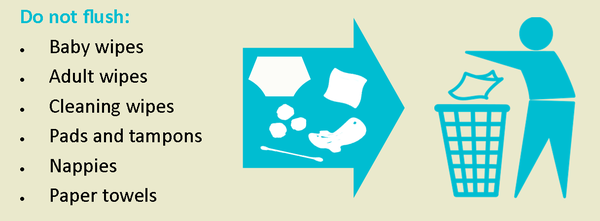Protecting sewers and plumbing in your home
If you want to avoid blockages and expensive plumbing problems, it’s wise to know what can and can’t go down your drains and toilets.
Wipes stop pipes

Did you know that so-called ‘flushable’ wipes aren’t as good for your loo as they seem?
Unlike toilet paper, these wipes don’t break down in water. Instead, they can clog up your pipes and leave you with a costly plumbing bill. Or, if they do make it into the sewer system, they can get tangled up with other objects and cause major blockages. These are not only expensive to fix, they can lead to sewer overflows which can have a harmful impact on our natural environment.
The best way to deal with any type of wipe is to put it in the bin. If you regularly use wipes in the bathroom or toilet, place a bin there so you can easily dispose of them.
And, if you really want to look after your loo, remember the three Ps rule – the only things that should go in your toilet are pee, poo and toilet paper.
Think at the sink
Take a minute to think at the sink, as putting the wrong things down there could leave you with an expensive plumbing bill.
Avoid putting fats, oils and grease down your sink as they can harden in your pipes. The same goes for food scraps, tea leaves and coffee grinds, which can build up over time and stick to the grease, causing a costly blockage.
Use a sink strainer and keep your pipes problem-free.
Looking after your toilet
Our toilets aren’t something we give a lot of thought to until something goes wrong. However, it’s important we all do our bit to look after the sewerage system in our area, as this helps protect the natural environment.
Here are some simple tips to help you do the right thing when looking after your toilet.
Not a garbage bin
What you put down your toilet has a big effect on the efficiency of the system. Avoid putting cotton buds, toothbrushes, sanitary wear, nappies, food scraps and other solid items down your toilet. If you use toilet fresheners that clip over the bowl, replace the plastic holder regularly and check that it’s firmly secured.
And remember, so-called 'flushable' wipes can’t be flushed - they cause blockages! Best to stick to the three Ps rule - the only things you should flush are pee, poo and toilet paper.
Medicines
Your sewerage system relies on biological processes to treat wastewater. Unfortunately, a lot of medicines, particularly antibiotics, can kill this kind of bacteria. Medications can also damage marine life when the treated wastewater is released into the environment. Please dispose of unwanted tablets appropriately. Ask your pharmacist for advice.
Chemicals
Chemicals have a similar effect on our treatment systems. They not only affect the bacteria, they introduce unknown elements to our treatment processes. Grease and oil are particularly hard to deal with as they clog up pipes and are difficult to remove at our sewage treatment plants.
Small quantities of cooking oil can be mopped up with a paper towel and placed in the garbage. Larger quantities should be stored in a container and disposed of for free at any of our Community Recycling Centres. You can also dispose of paint and other household chemicals this way.
Find your nearest waste management centre.
Start at the supermarket
You can also help to keep your community sewerage scheme healthy by choosing products that are low in phosphates. Phosphates are difficult and expensive to remove in the treatment process. The best way to avoid the problem is to select washing liquids or powders that carry the NP symbol. This means they contain no phosphates.